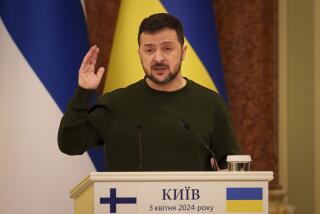One of Achille Lauro Hijackers Names Abbas as Planner, Italian Reports Say
- Share via
ROME — One of the four hijackers of the Achille Lauro was reported Wednesday to have named Abul Abbas, the Palestine Liberation Organization faction leader sought by the United States, as the mastermind of the terrorist operation.
Three prominent Italian newspapers reported, without confirmation, that one hijacker told investigating magistrates that Abbas planned and directed the Oct. 7-9 piracy of the Italian cruise liner.
During the terrorist siege, the hijackers killed a retired New York businessman, Leon Klinghoffer, and dumped his body overboard.
Deputy prosecutor Francesco Meloni of Genoa, one of the key investigators, refused to confirm or deny the report. Italy’s largest newspaper, Corriere della Sera of Milan, one of the papers that published the account, and the state-owned RAI radio said other investigators denied that any hijacker had linked Abbas to the operation.
‘Our Military Chief’
All three papers--La Repubblica of Rome and the Communist daily L’Unita, in addition to Corriere della Sera--said the talkative hijacker pinpointed Abbas as “our military chief” and that “it was he who directed our group.” The newspaper reports named no sources, attributing their information only to “leaks,” and did not identify the hijacker who supposedly named Abbas as the leader.
La Repubblica also reported that after the EgyptAir Boeing 737 carrying Abbas and the hijackers was intercepted by U.S. planes and forced to land in Sicily, the PLO leader told the hijackers that he would stage terrorist operations to gain their release.
“Don’t worry,” L’Unita quoted Abbas as telling the hijackers. “I will organize attacks and kidnapings against whichever country holds you and will demand an exchange with you.”
In the hours after the hijacking ended Oct. 9, Abbas was credited by Egypt and Italy with negotiating the surrender of the four terrorists, but the United States later said it had proof that he was really the arch-conspirator behind the operation.
Protest, Cabinet Crisis
Abbas was allowed to leave Italy despite an American arrest warrant and a request for his extradition. A bitter U.S. diplomatic protest followed. The subsequent resignation of Italian Defense Minister Giovanni Spadolini, who had angrily objected to Abbas’ release, brought down the 26-month-old government of Prime Minister Bettino Craxi.
Craxi defended his release of Abbas on the ground that he did not have sufficient proof under Italian law to hold him, even though the United States said it had supported the extradition request with “convincing” evidence.
Although his government fell over Abbas’ release, Craxi was named Monday to form a new government along the same lines as his last five-party coalition. With the new Cabinet still unassembled, he left Rome on Wednesday for New York to attend a meeting of Western leaders called by President Reagan.
Spadolini and his Republican Party still have not agreed to rejoin the coalition but are scheduled to resume negotiations with Craxi when he returns from New York.
More Problems for Craxi
The new disclosures concerning the hijackers, if true, could make Craxi’s task more difficult, since it was on the specific issue of the release of Abbas that Spadolini resigned. Spadolini has demanded greater influence in government decisions, sterner measures against terrorism and an overhaul of Italian foreign policy to make it more pro-Israeli and less pro-Palestinian.
Before the unconfirmed reports concerning Abbas were published, Craxi said he had no proof of the Palestinian’s guilt or innocence.
“We have no elements (of evidence) that permit us either to declare his non-involvement or his implication in the terrorist attack,” he said. “The magistrature (the inquiry arm of the courts) is carrying out its investigation, and it is certain that if it emerges that Abbas was responsible, it will act accordingly.”
The four hijackers have been held in a maximum-security prison in Spoleto, about 60 miles north of Rome, but Corriere della Sera said that the one who has reportedly opened up to investigators may have been transferred to a separate prison in northern Italy.
More to Read
Sign up for Essential California
The most important California stories and recommendations in your inbox every morning.
You may occasionally receive promotional content from the Los Angeles Times.












